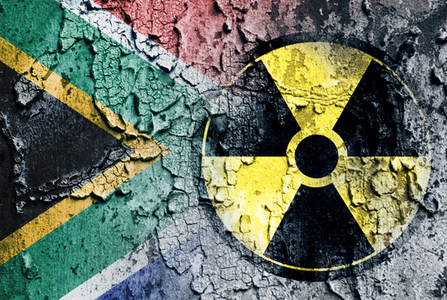1,000 signatures reached
To: NERSA, The Minister of Mineral Resources and Energy, Gwede Mantashe,
Say No to Nuclear Energy plans by 5th February

The South African government announced its plans to add 2,500MW more nuclear power to our electricity system. In November 2020, the National Energy Regulator of SA (NERSA) put out a paper outlining the details, with an invitation to you, the public, to comment on whether or not you agree with its new S34 Ministerial Determination [1] – which this campaign seeks to challenge.
We strongly believe there is NO place for this failed technology in our energy mix, for two key reasons. There’s NO need for more nuclear power in our energy system. It is unsafe, expensive and unnecessary. We don’t want the government to proceed, especially since there is enough evidence that renewable energy is cheaper and more environmentally-friendly.
We instead propose that this money is better spent to address electrification, community owned renewable energy, housing, social grants and now, procurement of the COVID-19 vaccine [2].
References
[1] NERSA Consultation Paper
http://nersa.org.za/wp-content/uploads/2020/11/Annexure-D-Consultation-Paper-for-Nuclear-Procurement.pdf?utm_source=SAFCEI&utm_campaign=808b335268-EMAIL_CAMPAIGN_2018_10_26_10_24_COPY_01&utm_medium=email&utm_term=0_e86d980456-808b335268-
[2] https://energypost.eu/5-charts-show-the-rapid-fall-in-costs-of-renewable-energy/
We strongly believe there is NO place for this failed technology in our energy mix, for two key reasons. There’s NO need for more nuclear power in our energy system. It is unsafe, expensive and unnecessary. We don’t want the government to proceed, especially since there is enough evidence that renewable energy is cheaper and more environmentally-friendly.
We instead propose that this money is better spent to address electrification, community owned renewable energy, housing, social grants and now, procurement of the COVID-19 vaccine [2].
References
[1] NERSA Consultation Paper
http://nersa.org.za/wp-content/uploads/2020/11/Annexure-D-Consultation-Paper-for-Nuclear-Procurement.pdf?utm_source=SAFCEI&utm_campaign=808b335268-EMAIL_CAMPAIGN_2018_10_26_10_24_COPY_01&utm_medium=email&utm_term=0_e86d980456-808b335268-
[2] https://energypost.eu/5-charts-show-the-rapid-fall-in-costs-of-renewable-energy/
Why is this important?
Nuclear power is dangerous, unhealthy and costly. We should instead move toward a just energy transition, investing in and supporting renewable energy (RE) sources. Not only is RE able to create a more inclusive energy landscape – giving formerly-excluded communities more of a chance to be part of the economy – the risks associated with RE are significantly less. Nuclear plants – big or small – are very expensive to set up, often with cost overruns and construction delays.
There are a number of reasons to create a groundswell of opposition against nuclear for South Africa’s energy mix.
1. As history has taught us, new nuclear procurement is where large scale corruption can, and has, taken place. In this instance, little to no information has been provided to the public on the cost and feasibility of new nuclear energy. Transparency is needed to build back public trust after past illegal and unconstitutional nuclear deals.
2. Nuclear power is not needed for our energy grid now or in the future. Especially during the covid crisis, we should not be looking at procurement of one of the most expensive forms of energy, but rather investment in more critical areas of need such as vaccines, education and employment.
3. The most recent Energy plan, IRP 2019, does not show necessity for the procurement of nuclear energy. Also no-one can guarantee 100% safety with nuclear energy. Radiation and radioactive waste created at nuclear power stations are extremely toxic. More nuclear power could put the health of workers – most-likely younger people – and communities at risk.
Consider for a moment what Electrical Engineer Hilton Trollip points out, “We absolutely do not need Koeberg to avoid load shedding. There are documented and proven sustainable electric systems that can run very well without nuclear and even without coal.”
Why then, is our government not more serious or committed to the #JustEnergyTransition? Nuclear is not the long-term solution South Africa needs to resolve the energy crisis, and it certainly will do much less for the economy than renewable energy.
References
https://ewn.co.za/2017/04/26/western-cape-high-court-rules-sa-nuclear-deal-unlawful-and-unconstitutional
https://theconversation.com/why-decommissioning-south-africas-koeberg-nuclear-plant-wont-be-easy-89888#:~:text=The%20potential%20cost%20of%20decommissioning,UK%20model%20at%20R76%20billion
https://www.iol.co.za/news/south-africa/western-cape/safety-concerns-over-koeberg-nuclear-plant-as-cape-town-tremors-grow-in-intensity-74d7b088-2840-41ee-a8a7-a40fa83451ee
There are a number of reasons to create a groundswell of opposition against nuclear for South Africa’s energy mix.
1. As history has taught us, new nuclear procurement is where large scale corruption can, and has, taken place. In this instance, little to no information has been provided to the public on the cost and feasibility of new nuclear energy. Transparency is needed to build back public trust after past illegal and unconstitutional nuclear deals.
2. Nuclear power is not needed for our energy grid now or in the future. Especially during the covid crisis, we should not be looking at procurement of one of the most expensive forms of energy, but rather investment in more critical areas of need such as vaccines, education and employment.
3. The most recent Energy plan, IRP 2019, does not show necessity for the procurement of nuclear energy. Also no-one can guarantee 100% safety with nuclear energy. Radiation and radioactive waste created at nuclear power stations are extremely toxic. More nuclear power could put the health of workers – most-likely younger people – and communities at risk.
Consider for a moment what Electrical Engineer Hilton Trollip points out, “We absolutely do not need Koeberg to avoid load shedding. There are documented and proven sustainable electric systems that can run very well without nuclear and even without coal.”
Why then, is our government not more serious or committed to the #JustEnergyTransition? Nuclear is not the long-term solution South Africa needs to resolve the energy crisis, and it certainly will do much less for the economy than renewable energy.
References
https://ewn.co.za/2017/04/26/western-cape-high-court-rules-sa-nuclear-deal-unlawful-and-unconstitutional
https://theconversation.com/why-decommissioning-south-africas-koeberg-nuclear-plant-wont-be-easy-89888#:~:text=The%20potential%20cost%20of%20decommissioning,UK%20model%20at%20R76%20billion
https://www.iol.co.za/news/south-africa/western-cape/safety-concerns-over-koeberg-nuclear-plant-as-cape-town-tremors-grow-in-intensity-74d7b088-2840-41ee-a8a7-a40fa83451ee
.png)
